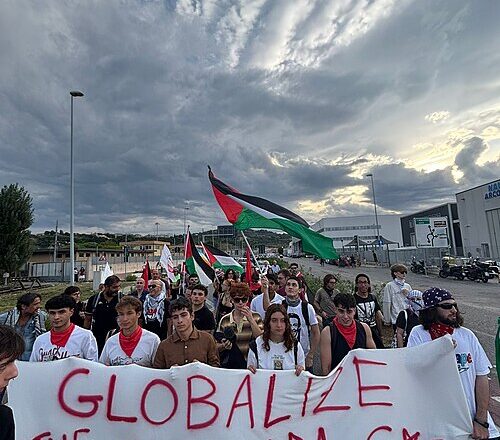Monday September 22nd saw over one million taking part in strikes and occupations against the massacre of Palestinians in Gaza and the shipment of arms to Israel. There were mobilisations in 85 locations.
In Milan, tens of thousands took part, in spite of heavy rain. In Genoa, again despite heavy rain, more than 600 port workers blocked the port, stopping a ship said to be carrying containers to Israel. In Bologna tens of thousands marched, before being attacked by water cannon and tear gas. Twenty thousand marched in the port town of Marghera. Truck drivers put on slowdowns at motorway toll booths, and freight trains were halted for 24 hours. In Livorno, dockers and students blocked the port. There were similar actions by dockworkers in La Spezia, Ravenna, Trieste and Venice. In Rome, the Termini railway station was blocked, causing the cancellation of many trains.
There were other actions and demonstrations in Palermo, Catania, Potenza, Bari, Lecce, Brindisi, Sassari, Cagliari, Bolzano, Pisa, Calenzano, and Novara. A blockade of an arms factory took place at Campi Bisenzio.
Schools and universities saw blockades and strikes too. The Faculty of Letters was occupied in Rome, as were universities at Florence and La Sapienza , whilst students blockaded campuses in Bologna and Torino. In Brescia there was a mass walkout by teachers. All ports were shut down, 90% of public transport and 50% of rail transport.
The demonstrations were huge, with 100,000 in Rome, and 50,000 in both Bologna and Genoa.
The strike action was organised by five grassroots unions, Confederazione Unitaria di Base (CUB), Unione Sindicale di Base (UB), Sindacato Generale di Base (SGB), Associazione Difesa Lavoratrici e Lavoratori (ADL Varese) and Unione Sindacale Italiana (USI-CIT), and by the Autonomous Collective of Dockworkers (CALP)—under the slogan Blocchiamo tutto (“Let’s Block Everything”). In addition to the demands around Gaza, the base unions attacked increasing military spending, the huge increase in precarious jobs, and the fall in real wages.
The actions were denounced by the far right Prime Minister Giorgia Meloni, who called those taking part “hooligans”. Her party, Fratelli d’Italia, has close links with Netanyahu’s Likud party, and she has reaffirmed her support for Israel.
For their part, the mainstream unions like CGIL took no part in the day’s actions, organising symbolic four hour stoppages before the 22nd. Right through September 22nd, the CGIL leadership refused to comment (Though much of the rank and file of CGIL has great sympathy for the actions).
Many young people took part in the September 22nd mobilisations, and there were many signs of unity between workers and students.
The mobilisation in Italy, like recent events in France, Serbia, Nepal, Indonesia, the Philippines, and Ecuador, points to the redevelopment of class consciousness and internationalism, and augurs further struggles. It is hardly any surprise that these developments are little reported on, or simply ignored, by the establishment media in the West.

